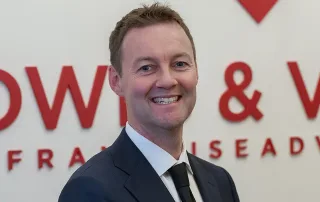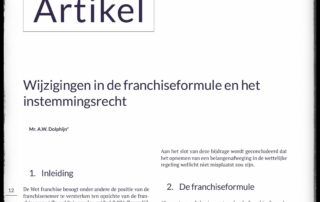Franchisors are always liable
Mr Th.R. Ludwig
A number of questions have arisen as a result of the ‘core obligations in the franchise relationship’ series. Is there strict liability with regard to incorrect provision of information in the pre-contractual phase by the franchisor to the franchisee? Do franchisors actually ever win a case involving this subject? Does it make sense for the franchisor to stop providing forecasts? These and other questions are addressed in this article.
CRITERIA
In the series referred to above, the criteria are indicated on the basis of which the implementation of the franchise relationship by the parties is assessed in practice. Franchisors must inform candidate franchisees clearly, correctly and completely about the possibilities of the future franchise relationship, preferably expressed concretely in an investment and operating forecast for a number of years, based on a sound feasibility study. If significant differences gradually arise with regard to the picture outlined in advance and this is related to incorrect estimates made in advance, the franchisor has the obligation to provide active advice and assistance to the franchisee who has run into problems as a result.
NUANCED ASSESSMENT
This does not mean that the franchisee is in all cases right when a matter involving these elements is assessed. At all times, interests are weighed up on the basis of the aforementioned criteria. In a case that a former franchisee had brought against a franchisor (arbitral judgment of 24 April 1995), the following was, among other things, at issue. The franchisor had submitted the operating budget belonging to the franchise agreement to the franchisee. However, the turnover achieved proved to be below the budgeted possibilities and expectations of the franchisee from the start of operation. Moreover, the franchisee had to purchase his products from the franchisor, whereby the price level used by the franchisor was not necessarily lower than that of other suppliers. The franchisee was therefore highly dependent. However, it was argued by the franchisor that the former franchisee had not always been very careful with the fulfillment of his obligations towards the franchisor. From the start, the franchisor has provided both oral and written advice to the former franchisee and confirmed various allegations in writing. However, this has not elicited any reaction from the former franchisee, either explanatory or apologetic. The franchisee was also accused of evading the meetings organized by the franchisor for the franchisees. He did little or nothing with the advice given to him and all in all showed no enthusiasm to be an active and involved part of the franchise organization in question as a franchisee. It was considered by judgment that it seems entirely reasonable that such an institution has had a negative effect on the operating result of the franchisee in question. On this basis, the arbitrators considered that the element of own fault in this matter was such that there were insufficient grounds, in fairness, to hold the franchisor liable for any damages. A similar picture can be deduced from Almelo District Court, 7 May 1997, no. 2338, Prg. 1997/47821, in which the franchisee alleged that he had erred in entering into the cooperation agreement because he had been given an incorrect representation of the facts by the franchisor. The allegedly incorrect statements would also be unlawful. It was stated that the turnover, profit and costs projected by the franchisor in its forecasts did not correspond to the actual situation. However, in the opinion of the court, the aforementioned assertions are insufficiently supported by the facts, as they appeared from the documents submitted. The alleged forecasts were drafts on which possible scenarios were presented to the franchisees. Furthermore, the forecast turnover was largely achieved. Although the costs turned out to be higher than proposed, the franchisee was expected to determine the extent of the costs to be incurred. In addition, before joining the franchise organization in question, the franchisee had already been working for some time as a salesperson for the same organization and was therefore deemed to be able to reasonably estimate what (additional) costs would have to be incurred. An appeal to a newspaper publication that predicted a higher income to potential franchisees than was actually possible for him turned out to be insufficiently relevant in the case of this franchisee. All in all, the franchisee backed down on this subject.
RISK LIABILITY?
There are more examples in legal practice in which franchisees have tried in vain to successfully invoke error, unlawfulness and/or shortcoming in connection with prognoses made by franchisors that are too rosy. In some cases, cases fail due to insufficient evidence, considerable own fault on the part of the franchisee or insufficient relevance with regard to the disappointing operating result in relation to the forecasted figures. However, in none of these cases have the criteria set out in the aforementioned series of articles been affected. It always turned out that the alleged shortcomings of the franchisor could not be made plausible, or that the franchisees themselves turned out to be the cause of the problems that had arisen. All issues in this area are assessed by means of a balancing of interests on the basis of the criteria developed in case law. There is therefore no risk liability.
NO MORE FORECASTS?
It makes no sense for franchisors to try to escape the venom of the problem referred to here by simply not providing any forecasts. As indicated earlier in the series previously indicated, this theme even lacks relevance. After all, the District Court and the Court of Appeal in ‘s-Hertogenbosch have already established that it does not matter whether the franchisor or the franchisee draws up the prognosis. The fact that the franchisor introduces the franchisee to the bank and apparently found no reason to qualify the allegedly incorrect figures is sufficient for that franchisor to be liable. It is part of the nature of the franchise relationship that, in accordance with the provisions of the European Code of Honor on Franchising, the franchisor provides both correct and complete information in the pre-contractual phase. Apparently the judiciary is of the opinion that if the franchisor perceives that the franchisee could be in error as a result of possible own actions in relation to the franchise agreement to be concluded with the franchisor, it is the duty of that franchisor as dominant party there to to call a halt. Incidentally, it should also be borne in mind that it is precisely the forecasts that generally strongly influence the decision of the potential franchisee whether or not to join the organization concerned. In this context, the question arises whether franchisors are still able to find new franchisees without providing forecasts in the light of an increasingly scarce market of franchisees and whether responsible financing of the franchisee’s business is possible – if there is even if a bank were found willing to provide financing without a sound investment and operating forecast, which should at least be supported by the franchisor and franchisee.
APPROACH
However, setting up and expanding a franchise organization need not be problematic in any way. Parties must do their homework properly. It is one of the franchisor’s core obligations to provide, if possible, a clear forecast, which should in any case be based on a concrete individualized feasibility study. This obligation is apparent from the European Code of Honor on franchising and various jurisprudence. The parties are then advised to cover any risks as indicated in the previous editions of Franchise Plus magazine. A good franchisor will also take out insurance should risks materialize nevertheless. If a problem situation nevertheless arises, the franchisor must actively provide advice and assistance in order to solve the problems that have arisen. It is advisable that the parties undertake in advance to make an arrangement within the framework of which that goal must be achieved in any case. If a franchise organization works as described here, little can go wrong. If this is the case, the risks are covered and a solution that is acceptable to both parties will be sought. Such an approach is very common for the better franchisor.
Mr Th.R. Ludwig is a lawyer in Rotterdam

Other messages
Mitigation of fine due to ‘dominant position’ of franchisor
Mitigation of fine due to 'dominant position' of franchisor ...
It is a non-competition clause at the end of the lease
In the judgment of 26 March 2024, ECLI:NL:GHSHE:2024:1035, the Court ...
Looking ahead: Bottlenecks at the end of the franchise agreement
Of course, everyone starts a collaboration with good courage. But ...
Not just a successful appeal to incorrect forecasts
Not just a successful appeal to incorrect forecasts Introduction ...
Changes to the franchise formula and the right of consent
An article by Mr. was published in the leading legal ...
The National Franchise podcast
Guests on the National Franchise podcast are: Theodoor Ludwig ...







